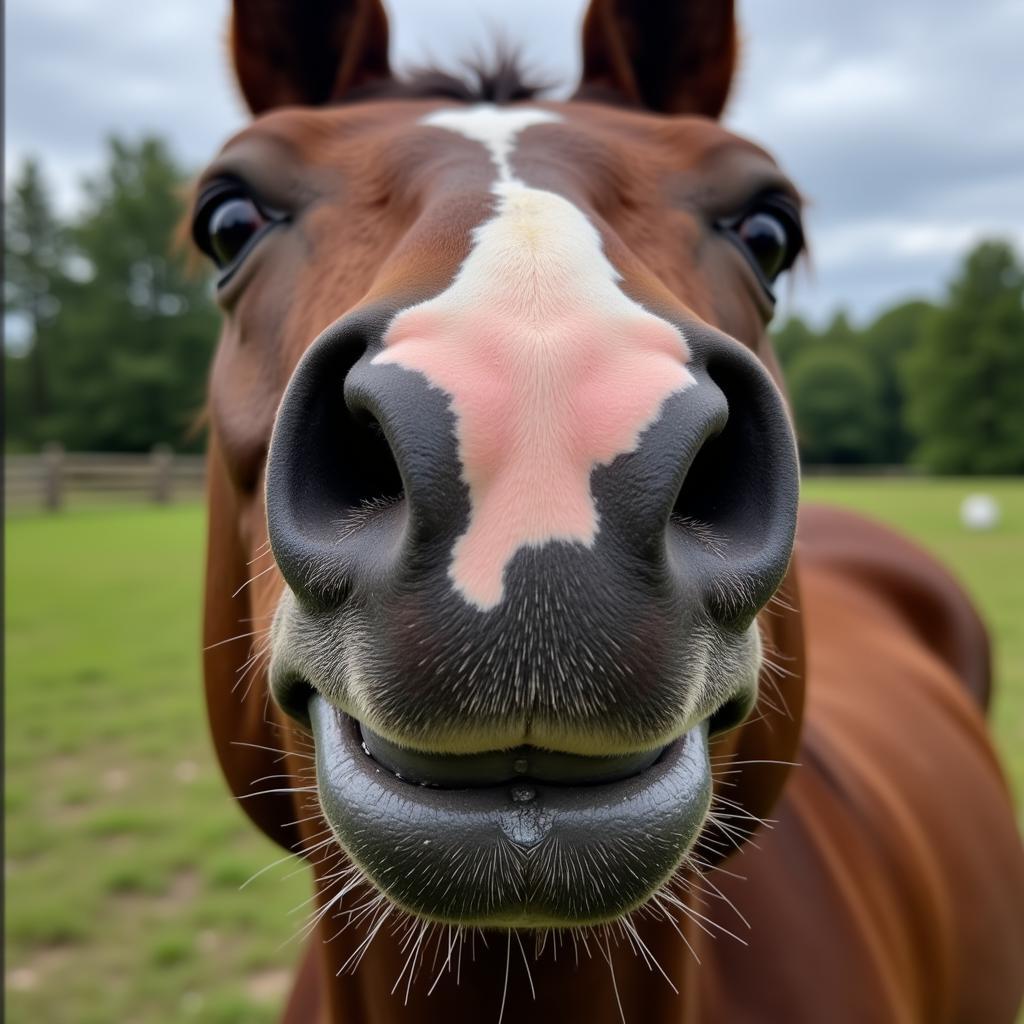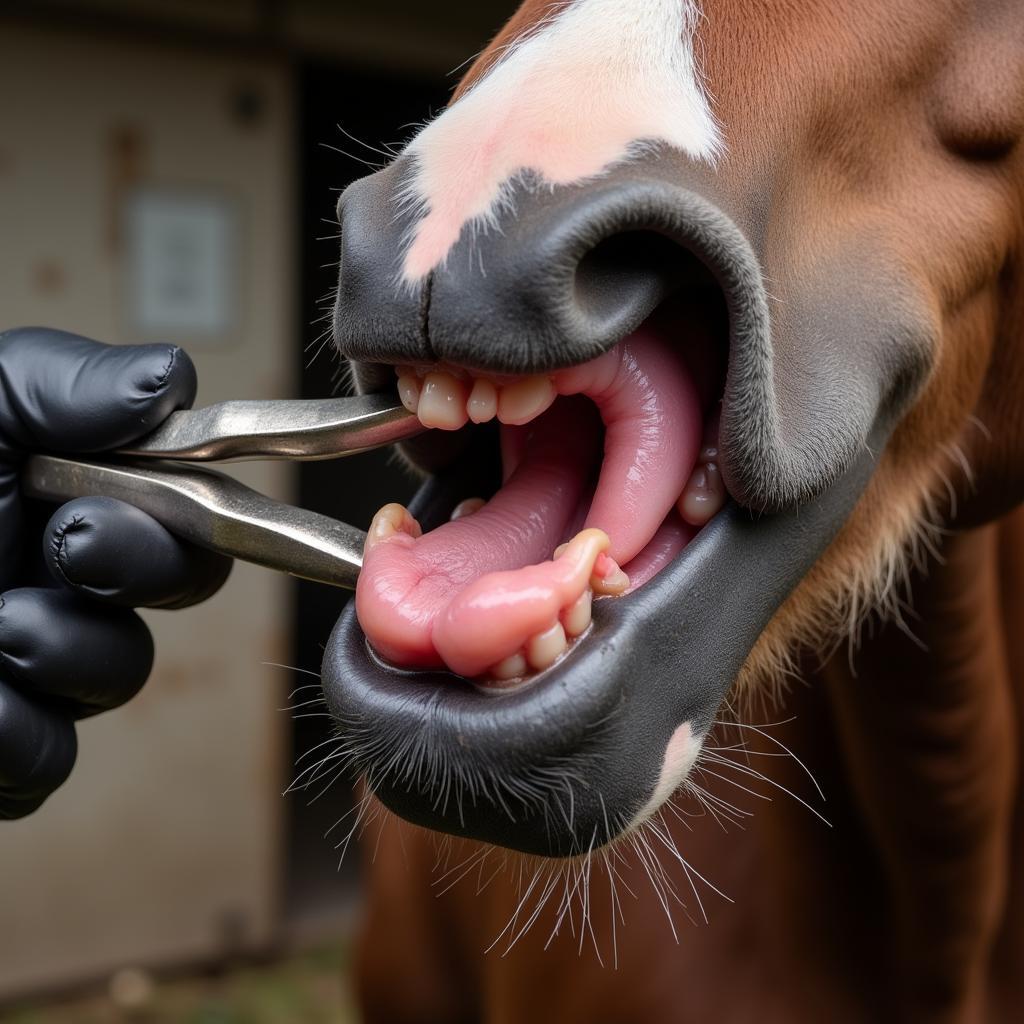Horse Mouth Foaming – it’s something every horse owner has seen, but is it always cause for concern? Just like with humans, a horse’s mouth produces saliva, a natural lubricant crucial for chewing and digestion. While a bit of froth around the lips can be entirely normal, excessive or unusual foaming can sometimes signal underlying issues. Let’s delve into the world of horse mouth foaming, differentiating between what’s typical and when it’s time to call the vet.
Common Causes of Normal Horse Mouth Foaming
Before we jump into the potential problems, it’s essential to understand why horses foam at the mouth naturally:
- The Act of Chewing: Have you ever noticed how much your horse salivates while eating? The simple act of chewing, especially when munching on hay or grass, stimulates saliva production. This helps soften food for easier swallowing and digestion.
- Bit Response: Some horses, particularly those in training, may foam at the mouth when ridden with a bit. This can be a natural response to the bit’s pressure and is often seen alongside relaxed jaw movement. However, excessive foaming combined with head tossing or other signs of distress may indicate a poorly fitted bit or improper riding techniques. cheek pieces on horses
- Excitement and Anticipation: Just like a dog drooling over a treat, horses can foam at the mouth when excited or anticipating something pleasurable, like a familiar trail ride or a tasty bucket of feed.
 Excited Horse Foaming at the Mouth
Excited Horse Foaming at the Mouth
When Horse Mouth Foaming Signals a Problem
While often harmless, excessive or unusual foaming can indicate a problem requiring veterinary attention. Here are some red flags to watch out for:
- Changes in Saliva: If your horse’s saliva changes consistency, becoming thick, stringy, or discolored (yellow, green, or tinged with blood), it’s crucial to contact your vet. This can indicate a dental issue, infection, or other medical condition.
- Foaming Accompanied by Other Symptoms: Foaming combined with other symptoms such as loss of appetite, lethargy, weight loss, coughing, nasal discharge, or diarrhea warrants immediate veterinary attention. These could be signs of a more serious underlying illness. horse foaming at mouth and not eating
- Sudden Onset of Excessive Foaming: If your horse suddenly starts foaming excessively without any apparent reason, it’s best to err on the side of caution and consult your vet.
Potential Causes of Abnormal Horse Mouth Foaming
Several factors can contribute to abnormal horse mouth foaming, ranging from mild irritations to severe health conditions:
1. Dental Problems:
Dental issues are among the most common culprits of abnormal foaming. Sharp enamel points, tooth root abscesses, or other dental problems can irritate your horse’s mouth, leading to excessive salivation. Regular dental checkups by an equine dentist are crucial for preventing and addressing these issues.
2. Oral Injuries:
Cuts, abrasions, or foreign objects lodged in the mouth can also cause increased salivation and foaming. Regularly inspect your horse’s mouth for any signs of injury, especially if you notice sudden changes in their behavior or eating habits.
 Horse with a Mouth Injury
Horse with a Mouth Injury
3. Poisonous Plants:
Ingestion of toxic plants is a serious concern for horse owners. Many plants can cause various symptoms in horses, including excessive salivation. Familiarize yourself with poisonous plants in your area and ensure your pastures are free of them.
4. Digestive Upset:
Just like us, horses can experience digestive upset. Conditions like colic or gastric ulcers can lead to increased saliva production and foaming at the mouth. If you suspect your horse is suffering from digestive issues, contact your vet immediately.
5. Respiratory Infections:
While less common, respiratory infections can also cause horses to foam at the mouth. This is because the infection may make swallowing difficult, leading to saliva buildup.
When to Call the Vet
As a responsible horse owner, it’s always better to be safe than sorry. If you notice any of the following, it’s essential to contact your veterinarian:
- Excessive and unusual foaming
- Changes in saliva color or consistency
- Foaming accompanied by other symptoms
- Sudden onset of foaming with no apparent cause
Prompt veterinary care can make a significant difference in your horse’s well-being.
Preventing Horse Mouth Foaming
While not all causes of horse mouth foaming are preventable, there are steps you can take to minimize the risk:
- Schedule regular dental checkups: Routine dental care by an equine dentist can prevent and address dental problems that contribute to foaming.
- Inspect your pastures: Regularly check your pastures and remove any potentially poisonous plants.
- Introduce new feeds gradually: Sudden changes in diet can upset your horse’s digestive system, potentially leading to foaming. Always introduce new feeds slowly.
- Monitor your horse’s bit: Ensure your horse’s bit fits correctly and is not causing any discomfort or pain. bit horse abuse Consider bitless options if needed.
Conclusion
Horse mouth foaming is a common occurrence that can be perfectly normal in many cases. However, it’s crucial to differentiate between harmless foaming and potential warning signs. By understanding the common causes of both normal and abnormal foaming, as well as the red flags to watch out for, you can help ensure your equine companion stays healthy and happy.
Remember: You know your horse best. If you notice anything unusual or concerning, trust your instincts and contact your veterinarian for guidance.
Need help choosing the right bit for your horse? Check out our article on no chew for horses.
For more information about other common horse health concerns, visit horse foaming.
If you need immediate assistance, please contact us at Phone Number: 0772127271, Email: [email protected] or visit our address at QGM2+WX2, Vị Trung, Vị Thuỷ, Hậu Giang, Vietnam. We have a dedicated customer service team available 24/7.